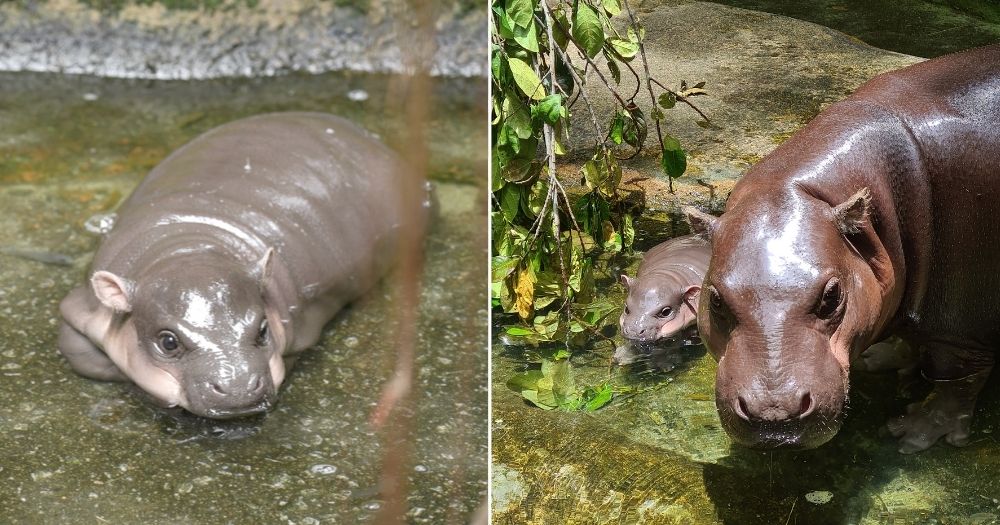Follow us on Telegram for the latest updates: https://t.me/mothershipsg
Turns out happiness comes in a small greyish-black bundle and goes by the name of Miata.
On Apr. 20, Wildlife Reserves Singapore (WRS) revealed the latest addition to the Singapore Zoo.
Miata, the first born
Miata is the first baby pygmy hippo born after four years. The last recorded newborn pygmy hippo was in November 2017 to a calf called Abina.
Born on Feb. 23, Miata's name is of African origin and translates to "first born".
She is the first calf of a 10-year-old male named Divo and a 11-year-old female named Psota (pronounced "Soh-ta"), which went through a natural birthing process.
Miata and Psota. Image courtesy of Wildlife Reserves Singapore
WRS told Mothership that Miata was supposed to be a twin. Unfortunately, survival rates of twin calves are extremely low, and Miata lost her other twin.
Twin pygmy hippopotamuses births are extremely rare. Only 11 have been documented thus far, and not including Miata's, the last registered twin birth took place in 2015.
Miata is the 25th successful pygmy hippo birth in the Singapore Zoo and her father, Divo, was amongst this bloat of pygmy hippopotami.
WRS told Mothership that Miata is a little shy and can be found hanging around her mother Psota during meal times.
When she's not napping, Miata is curious and playful. She also loves splashing in the water trough.
Miata enjoys splashing in the water. (Video courtesy of Wildlife Reserves Singapore)
Pygmy Hippos are endangered
Endemic to Upper Guinea Forest of West Africa, pygmy hippos are native to West Africa and can only be found there.
The Pygmy Hippo Foundation estimated that around 2000 wild pygmy hippos remain in the Upper Guinean Forest.
Classified as endangered under IUCN Red List of Threatened Species, pygmy hippos are at a very high risk of extinction in the wild.
Wild pygmy hippos are at risk due to a loss of their habitats. They are poached and hunted for bushmeat as well.
Thankfully, these creatures breed well under captivity.
More informational tidbits about pygmy hippos
Pygmy hippos look more purplish-grey rather than the expected greyish-black.
This is a result of a secretion that is known as hipposudoric acid, or "blood sweat", which is neither sweat nor blood.
The pinkish secretion is believed to have antiseptic and sunscreening properties.
Pygmy hippos do not have sweat glands and their skin tends to dry out pretty easily. To prevent this, the clever animals spend most of their time out in swamps and rivers.
Miata hiding under a shrub. (Video courtesy of Wildlife Reserves Singapore)
